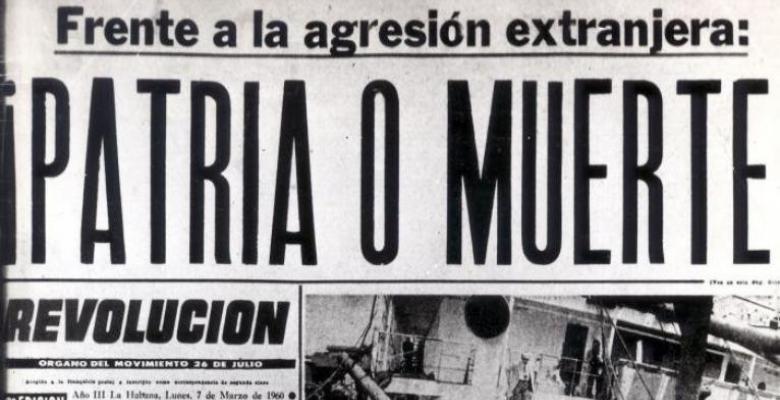The Blowing of La Coubre and the Day Fidel said Homeland or Death
especiales

There are key moments in the life of peoples; there are minutes that are extraordinary, and a minute like that one is this tragic and bitter minute that we live today (...)
For the second semester of 1959 and during 1960, counterrevolutionary organizations and spy networks linked to the North American Central Intelligence Agency (CIA) spread throughout Cuba. Actions of hostility towards the Revolution increased: planning of attacks on leaders, formation of guerrillas against the government, bombing of towns and socioeconomic sites, air space, electromagnetic, and maritime space violations...
In this context, the Revolutionary Government planned to strengthen its military capacity. However, it had to overcome the obstructions the United States government imposed to deter access to military supplies. Fidel Castro himself would explain that “the English government declared that the North American government was interested in preventing us from acquiring airplanes in England; the very U.S. authorities and spokespersons have said it (…)”.
In Belgium, a U.S. diplomat and military attaché had also pressured the government to stop the sale of weapons to Cuba. Finally, the National Factory of War Arms, resisting the pressure of the emissaries of the United States, arranged the sale with Cuba.
(…) What are the chances for a grenade to explode from its crate if it falls? Do grenades come without safety pins? Do grenades come loose inside the crates? Is it that these products are transported without safety for those who handle them, for those who load and unload them? (…)
Around 3:00 p.m. on March 4th, 1960, exploded in Havana harbor the French Ship La Coubre. It had sailed days earlier from Antwerp, Belgium, and was carrying bullets, anti-tank, and anti-personnel grenades for the FAL rifle purchased by Cuba from the Belgian factory.
The Cuban historian José Cantón Navarro (1925-2008) referenced in the text Historia de Cuba 1959-1999. National liberation and socialism that the event caused 101 dead, including seven French sailors, and hundreds of wounded." Other sources assert that the figures differ from these by narrow margins.
In his speech at the Colón cemetery the following day, during the funeral services for the deceased, Fidel explained details of the investigative process that followed the explosion.
In addition to questioning the ship's crew and participants in the unloading of weapons, Rebel Army officers were ordered to launch two boxes of grenades of both types from a plane, at 400 and 600 feet. "The boxes penetrated several feet into the ground due to impact, and the wooden crates were smashed without a single one of the 50 grenades inside exploding," Fidel explained to those gathered at the funeral.
Although some sources defend the line that there’s no conclusive evidence regarding the connection between the United States and the explosion of La Coubre steamship, several Cuban and foreign researchers agree that on March 4th, Cuba experienced the largest CIA attack of the 20th century. For the Colombian journalist Hernando Calvo Ospina (1961-), director of the documentary El Enigma de La Coubre, what caused the explosions was placed on the ship before leaving Europe. According to his studies, the La Coubre incident resulted from a CIA terrorist action.
(…) And not only we’ll know how to withstand any aggression, but we’ll know how to overcome any aggression, and that again we would have no other choice than the one which sparked the revolutionary struggle: freedom or death. Only now freedom means much more: freedom means homeland. And our choice would be homeland or death (...)
The steamship La Coubre suffered two blasts when part of the cargo had been unloaded. The second blast was even greater than the first one. Besides, Fidel, Almeida and other revolutionary leaders immediately arrived at the site of the disaster to organize the evacuation and rescue of victims. They say that Che Guevara personally provided medical assistance to several victims.
The funeral for the deceased was held the following day. Fidel, who back then was the Prime Minister of the Revolutionary Government, addressed the crowd. The emotion involved in burying innocent people and the popular reason to protect the sovereignty of the nation without giving in to difficulties, led to a sentence: homeland or death!
Translated by: Amilkal Labañino Valdés /Cubasí Translation Staff













Add new comment